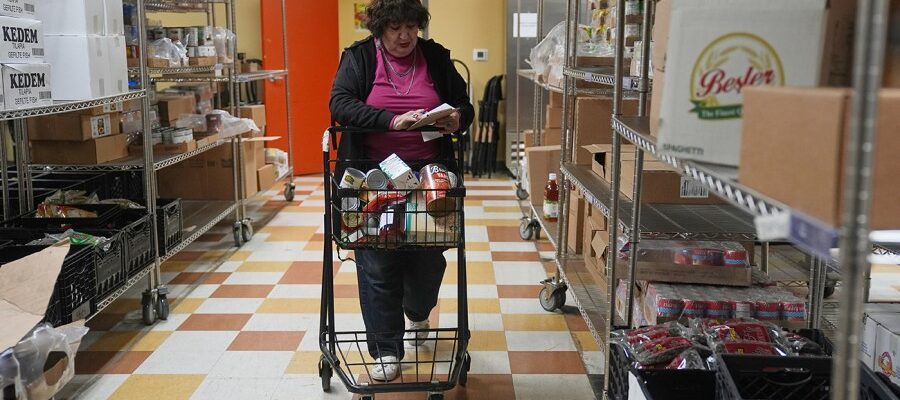Some states scramble to maintain food access before potential SNAP lapses

States are resorting to last-ditch efforts to preserve access to groceries for their residents as the federal government prepares for an Oct. 31 deadline to stop sending food benefits while the government shutdown continues.
The US Department of Agriculture (USDA) said it would not provide Supplemental Nutrition Assistance Program (SNAP) benefits starting Saturday, after the Trump administration refused to draw on a contingency fund. But two court rulings reversed that course.
Two federal judges on Friday ordered the White House to use emergency funds to keep SNAP operating.
President Trump indicated hours later that the USDA would release contingency funding.
Late Friday, Trump said on Truth Social that he would be “honored” to fund SNAP “if we are given the appropriate legislative guidance.” He maintained, however, that “our government lawyers don’t think we have the legal authority to provide SNAP with certain amounts.”
About 1 in 8 people in the United States, or about 42 million people, receive SNAP benefits each month. Lawmakers in Congress tried to pass legislation to ensure continued funding, but the effort failed to rally enough support behind it.
With time running out and White House intervention uncertain, many states have rushed to ensure continuity in the interim.
Here are some contingency plans and realities states are grappling with as SNAP benefits expire on Saturday:
state of emergency
States and territories including California, the District of Columbia, Louisiana, New York and West Virginia have set up emergency funds for food banks and SNAP beneficiaries ahead of the expected cessation of benefits.
“Unlike Washington Republicans, I will not sit idly by as families struggle to put food on the table. Today, I’m declaring a state of emergency and committing additional state funding for emergency food assistance to ensure New Yorkers don’t go hungry. Donald Trump and Republicans in Congress have the power to stop this crisis — millions of families depend on it,” New York Governor Kay said in a statement Thursday.
States are limited in their ability to stop a massive impact. Hochul’s office reiterated that no state can replace federal SNAP benefits. In New Mexico, Governor Michelle Lujan Grisham (D) announced that $30 million will be released to provide assistance to SNAP beneficiaries, but they will only receive it until November 10.
Louisiana Gov. Jeff Landry (R) also declared a state of emergency last week that will last until Nov. 4, but he leaned toward GOP rhetoric that safety net programs should be more limited.
“I urge those who are able to continue their efforts to end SNAP and similar programs. These programs are not reliable because of the political games of the Democrats,” Landry said.
“I encourage our citizens to seek out the thousands of new job opportunities across our state, and to free ourselves from these social programs used as weapons by the left to score political points.”
California Gov. Gavin Newsom (D) deployed the California National Guard to support food banks and fast-forwarded $80 million in state aid. California was one of more than 20 states to sue the Trump administration over its decision not to fund SNAP during the shutdown.
Community-driven efforts
Food banks across the country are preparing for an influx of people, with many already experiencing increased traffic ahead of the November deadline. Governors were directing funds directly to food banks ahead of the expected failure.
“We gave away about 5,000 pounds of food in two days,” Craig Gordy with the Oskaloosa Food Pantry in southeast Iowa told Brownfield Ag News. “Typically, we give about 300 or 400 pounds. People are hoarding because they know SNAP isn’t coming.”
Seattle plans to send up to $4 million per month to food banks until SNAP benefits are restored.
Agriculture Secretary Brooke Rollins proposed in early October that billionaire George Soros fund SNAP by November. It was announced Friday that billionaire Mark Cuban has indeed made a donation to Pennsylvania Food Aid.
According to Pennsylvania Gov. Josh Shapiro (D), Cuban joined a group of businessmen and lawmakers to make the donation.
“Each of these individuals stepped up in the early hours of our campaign to help feed Pennsylvanians on top of the private or public dollars we’re putting out,” Shapiro said.
Major businesses have also gotten involved, with food delivery service DoorDash announcing this past week that it will waive service and delivery fees for food banks for 300,000 grocery orders for SNAP.
States are in turmoil
Some states could not finalize plans for continued food aid until Friday, before Trump weighed in.
Last week, Oklahoma Human Services (OHS) confirmed that SNAP benefits will be suspended in the state beginning November 1 OHS encouraged SNAP-dependent families to lock their EBT cards when not in use, making it clear that electronically stolen funds will not be returned.
Oklahoma officials said late Friday that a vote will be held Monday to give $1 million per week to Oklahoma food banks, as Oklahoma Voice reported.
Oklahoma Gov. Kevin Stitt (R) said in a joint statement with legislative leadership that the money would come from the state’s $7.8 million emergency fund.
Mississippi similarly told more than 350,000 of its SNAP beneficiaries that payments would not be made in November when SNAP funds run out. As WLBT reported this past week, state government doesn’t appear to have plans to intervene at this point, something Gov. Tate Reeves (R) acknowledged.
“Sadly, there is no easy way for state government to step up and make Washington Democrats pay for the tens of millions of dollars in damages caused by this shutdown,” Reeves said in a statement.
